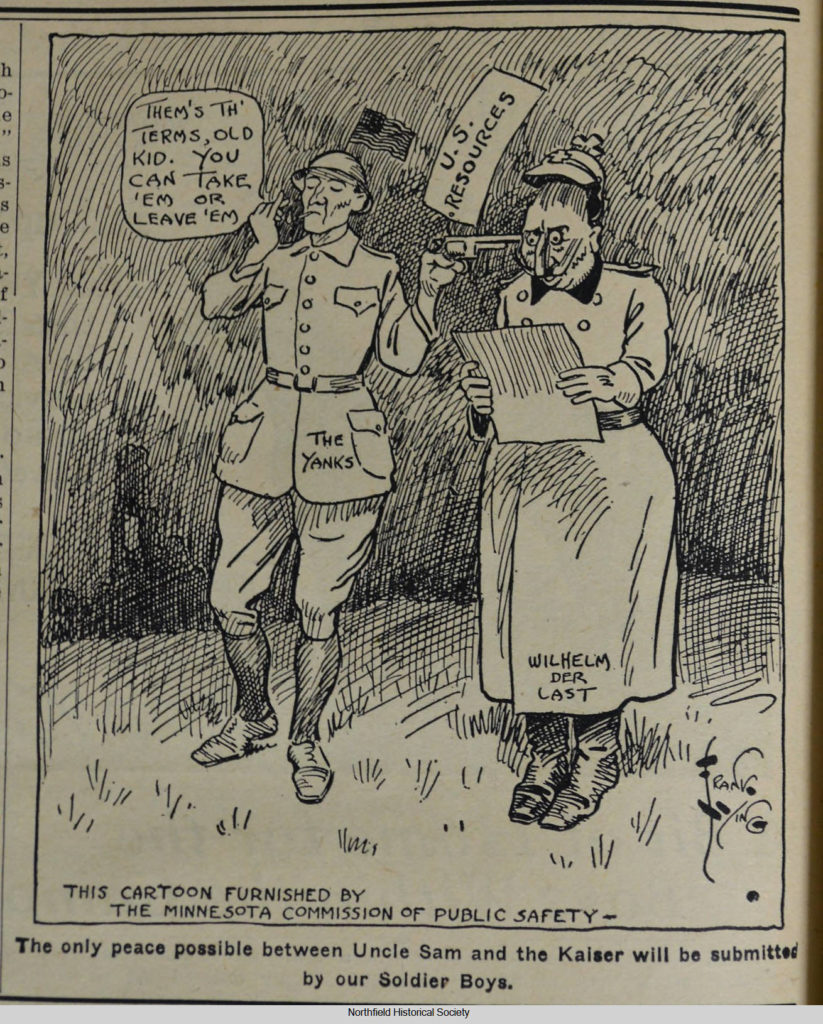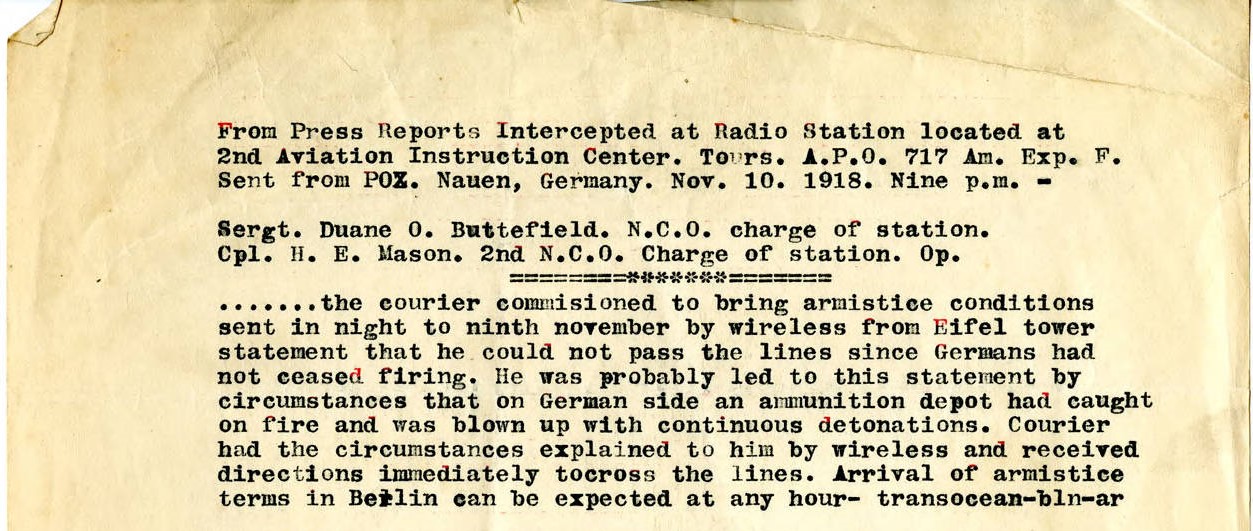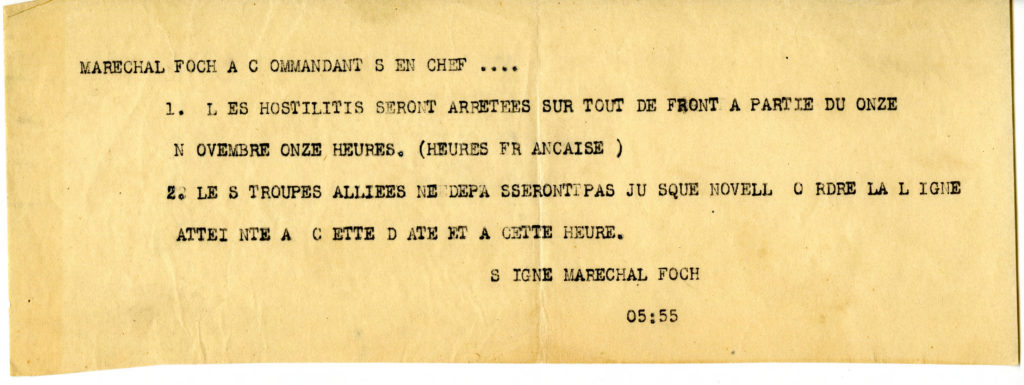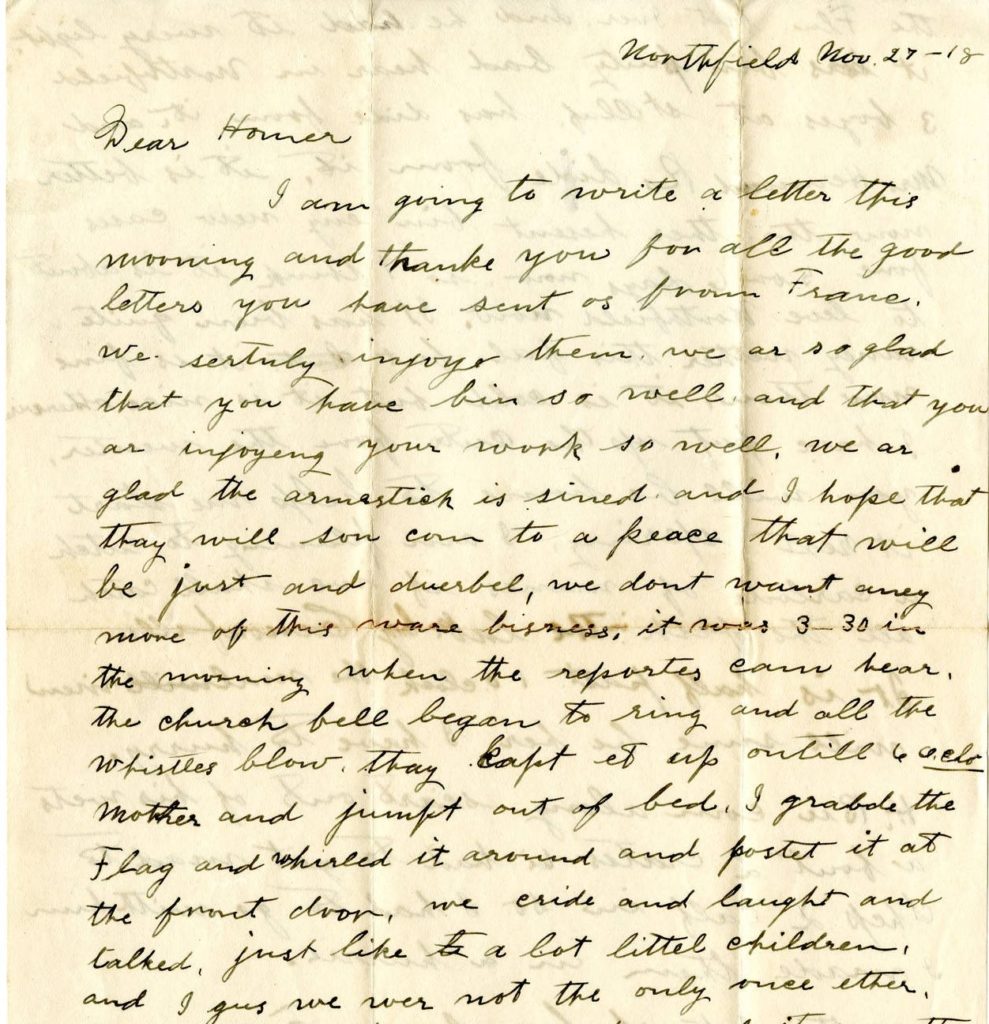One hundred years ago this month, people in Northfield waited with the rest of the world to hear that the devastating Great War was finally over. Rumors that Germany was going to agree to an Armistice—or cease-fire—ran rampant.
On November 8, 1918, the Northfield News ran a political cartoon showing American troops, and American resources, were forcing Germany’s Kaiser to end the war. It was more than wishful thinking, since at that very moment a German delegation was considering the terms of an armistice with the Allied countries.

Northfield News cartoon, published Nov. 8, 1918
Homer Mason, one of Northfield’s service men stationed in France, was the assistant N.C.O. in charge of a radio station. At his post, he frequently received press reports sent out by the Allied troops. It was here, he later wrote, that he heard Germany “send out her press at the critical period before the armistice was signed.” He sent copies of these press reports to his parents.

Press Report, delivery of Armistice terms, Nov. 10, 1918
The very next day, November 11, 1918, Homer had just come into the station when he heard that the French Marshal Ferdinand Foch had just sent out his orders to all of the Allied troops to cease firing at 11 o’clock French time. The Germans had signed the Armistice terms, and the war was finally over.

Order from Marshal Foch, November 11, 1918. Translation available on the Collaborative.
The world rejoiced, but none as much as people in France, whose country had been completely devastated by trench warfare and German occupation. Homer reported that “The French people are certainly a happy bunch of folks nowadays. They are celebrating everywhere.”

Letter from Homer Mason to his parents, Nov. 13, 1918
Northfield was celebrating, too. Homer’s parents both told of the jubilation they felt and provided details on just how Northfield celebrated the end of the war. On November 12, Homer’s mother Melinda wrote:
This is a day after we got the news that the war was over, but yesterday I could not write – so many came in and then there was so much merriment and noise that you could not hear yourself think. The bells commenced to ring at 3:30 in the night. We got up and lit up the whole house. We knew what it meant and how glad and thankful we [were]. And after it got light the soldiers came and the band and after that, all the school children, with old pails and dish pans and anything they could make noise on. All [are] so thankful it is over.
Homer’s father, George, later said all the church bells and whistles in town blew after they got the news at 3:30 a.m. and they “kept it up until 6 o’clock.” He said he “grabbed the Flag and whirled it around and posted it at the front door.”

Letter from George Mason to Homer Mason, November 27, 1918
“We are glad the armistice is signed,” wrote George, “and I hope that they will soon come to a peace that will be just and durable. We don’t want any more of this war business.”
What did the Armistice mean for the boys from Northfield stationed in places “over there” as well as “over here”? It did not mean they could come home immediately, especially since it only halted the military operation of the war. The official end to the war came with the signing of the Treaty of Versailles on June 28, 1919.
In the meantime, servicemen stationed in Europe changed their focus from military offensive to occupying force. Homer Mason, for one, hoped he would be home by the summer [he was]. Other servicemen, like Northfield’s Arthur Houston and his road crew, now focused on rebuilding blasted roads without the threat of German bombs overhead. Others were recovering in hospitals from injuries or the flu, serving as military escorts, and other duties as assigned by the American Expeditionary Force.
Some Northfield residents served the military at camps scattered throughout the United States. When the Armistice was signed, and a military force at peak strength was no longer necessary, many of them were given a few options. Fredrick Heiberg was at an officer’s training school at the time, and he reported on November 16 that he was offered three options:
- Remain here and finish his course – get a commission and be placed in the Reserve Corps.
- Get an immediate discharge from the Army.
- For men from S.A.T.C. units to return to them.
“Which should I choose?” he asked his mother. “After considering all points from all angles and points I think I’ll choose the second.” He was discharged on November 30, 1918, returned to Northfield shortly after that, and became a dentist.
With the Armistice came the end of fighting the “war to end all wars”. The Northfield men and women who served remained forever changed by their experiences. We honor their service and sacrifice every year on Veterans Day, but especially this year—the 100th Anniversary of the Armistice.
